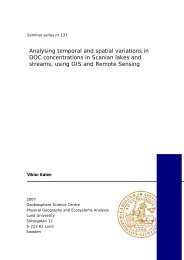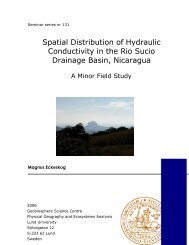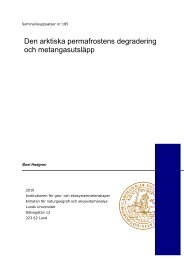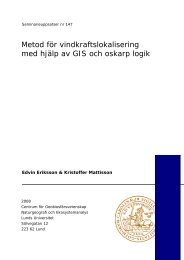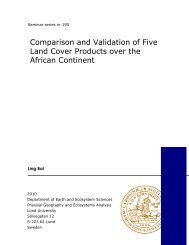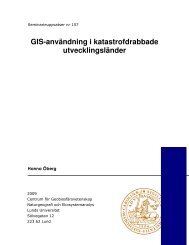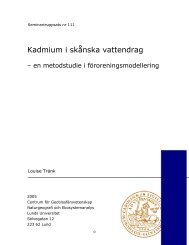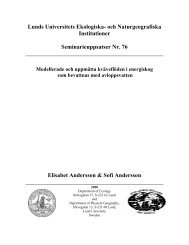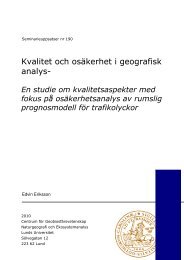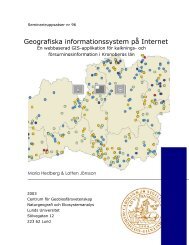Finding Potential Sites for Small-Scale Hydro Power in Uganda: a ...
Finding Potential Sites for Small-Scale Hydro Power in Uganda: a ...
Finding Potential Sites for Small-Scale Hydro Power in Uganda: a ...
Create successful ePaper yourself
Turn your PDF publications into a flip-book with our unique Google optimized e-Paper software.
component to all of these issues, generat<strong>in</strong>g numerous and collaborat<strong>in</strong>g impacts ondevelopment.However Holland et al. (2001), argues that the benefits of electricity, compared to other<strong>for</strong>ms of energy, are its usefulness and convenience. Electricity can stimulatedevelopment that is already tak<strong>in</strong>g place, but it will not <strong>in</strong>itiate development.“Communities, which are very poor, with very little economic activity, are unlikely toderive much economic benefit from an electricity supply, although they may derivesubstantial social benefits from better light<strong>in</strong>g and communication”. In addition Ramani(1993) discusses that there is no direct correlation between rural electrification andeconomic growth lead<strong>in</strong>g to rural development, though admits its role <strong>in</strong> promotion ofeconomic growth. Rural electrification can result <strong>in</strong> greater impacts on productivity <strong>in</strong>comb<strong>in</strong>ation with other factors and conditions regard<strong>in</strong>g availability or creation ofnecessary <strong>in</strong>frastructure facilities.3.3.4 <strong>Uganda</strong>’s Rural Electrification Strategy and PlanIn order to <strong>in</strong>vestigate and learn more about what actions the Government of <strong>Uganda</strong>takes to contribute to an <strong>in</strong>creased development through rural electrification, we<strong>in</strong>terviewed a newly founded <strong>in</strong>stitution <strong>in</strong> <strong>Uganda</strong>, called the Rural ElectrificationAgency (REA). This chapter is the result of that <strong>in</strong>terview.3.3.4.1 Background<strong>Uganda</strong>’s Electricity Act, 1999, provides that the m<strong>in</strong>ister responsible <strong>for</strong> electricity shallprepare a susta<strong>in</strong>able and coord<strong>in</strong>ated Rural Electrification Strategy and Plan <strong>for</strong> <strong>Uganda</strong>.The Strategy and Plan are designed to overcome the ma<strong>in</strong> barriers of rural electrificationby the establishment of an appropriate framework composed of a Rural ElectrificationAgency, a Rural Electrification Board, a Rural Electrification Fund allow<strong>in</strong>g provision ofgrants and subsidies on <strong>in</strong>vestment costs and a Rural Electrification Master Plan toprovide <strong>in</strong><strong>for</strong>mation on <strong>in</strong>vestments opportunities. The Rural electrification Strategy<strong>for</strong>ms an <strong>in</strong>tegrated part of the government’s wider rural trans<strong>for</strong>mation and povertyeradication agenda. Susta<strong>in</strong>able rural development with <strong>in</strong>crease <strong>in</strong> rural <strong>in</strong>comes andquality of life h<strong>in</strong>ges critically upon enabl<strong>in</strong>g small and medium rural enterprises aseng<strong>in</strong>es of economic growth and provision of basic social services to meet communityneeds such as health, education, water, telecommunication services and light<strong>in</strong>g.28



